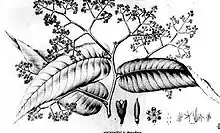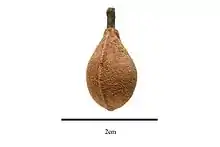Virola elongata
Virola elongata (syn. Virola theiodora ) is a species of tree in the family Myristicaceae. The tree is native to Panama, Guyana, Brazil (Acre, Amazonas, Mato Grosso, Pará, Rondônia and Roraima), Bolivia, Colombia, Ecuador and Peru.[1][2] It is also found in Suriname.[2] Virola elongata is thin and 7.5–23 m (25–75 ft) tall, sometimes 30 m (98 ft) tall.[2]
| Virola elongata | |
|---|---|
 | |
| Virola elongata 1860 Illustration | |
| Scientific classification | |
| Kingdom: | Plantae |
| Clade: | Tracheophytes |
| Clade: | Angiosperms |
| Clade: | Magnoliids |
| Order: | Magnoliales |
| Family: | Myristicaceae |
| Genus: | Virola |
| Species: | V. elongata |
| Binomial name | |
| Virola elongata | |
| Synonyms | |
The trunk is about 43 cm (17 in) in diameter, cylindrical and has smooth brown and gray bark. The fruit is ellipsoidal to subglobular, 11–20 mm (0.43–0.79 in) long, 10–15 m (33–49 ft) in diameter and comes in groups of 40.[2] The tree is found in evergreen forests and in scrub up to 800 m (2,600 ft) in altitude.[2]
The Yanomami people use the powdered resin as an entheogen known as nyakwána which is inhaled or "snuffed" into the nasal cavity, it contains a high concentration of 5-MeO-DMT and DMT.[3]
Virola elongata extracts have weak antibacterial activity against Enterococcus faecalis and Staphylococcus aureus.[4]
Fruit and seeds


References
- "Virola elongata". Germplasm Resources Information Network. Agricultural Research Service, United States Department of Agriculture. Retrieved 2008-04-05.
- "Plantes et botanique :: Virola elongata". www.plantes-botanique.be. Archived from the original on 2007-05-19. Retrieved 2008-04-30.
- Agurell, S; Holmstedt, B; Lindgren, JE; Schultes, RE (1969). "Alkaloids in certain species of Virola and other South American plants of ethnopharmacologic interest". Acta Chemica Scandinavica. 23 (3): 903–16. doi:10.3891/acta.chem.scand.23-0903. PMID 5806312.
- Suffredini, Ivana Barbosa; Paciencia, Mateus Luís Barradas; Varella, Antonio Drauzio; Younes, Riad Naim (2006). "Antibacterial Activity of Brazilian Amazon Plant Extracts" (PDF). Brazilian Journal of Infectious Diseases. 10 (6): 400–2. doi:10.1590/S1413-86702006000600008. PMID 17420913.